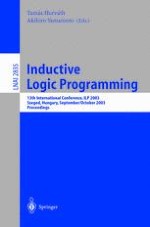2003 | OriginalPaper | Chapter
Graph Kernels and Gaussian Processes for Relational Reinforcement Learning
Authors : Thomas Gärtner, Kurt Driessens, Jan Ramon
Published in: Inductive Logic Programming
Publisher: Springer Berlin Heidelberg
Included in: Professional Book Archive
Activate our intelligent search to find suitable subject content or patents.
Select sections of text to find matching patents with Artificial Intelligence. powered by
Select sections of text to find additional relevant content using AI-assisted search. powered by
Relational reinforcement learning is a Q-learning technique for relational state-action spaces. It aims to enable agents to learn how to act in an environment that has no natural representation as a tuple of constants. In this case, the learning algorithm used to approximate the mapping between state-action pairs and their so called Q(uality)-value has to be not only very reliable, but it also has to be able to handle the relational representation of state-action pairs.In this paper we investigate the use of Gaussian processes to approximate the quality of state-action pairs. In order to employ Gaussian processes in a relational setting we use graph kernels as the covariance function between state-action pairs. Experiments conducted in the blocks world show that Gaussian processes with graph kernels can compete with, and often improve on, regression trees and instance based regression as a generalisation algorithm for relational reinforcement learning.
